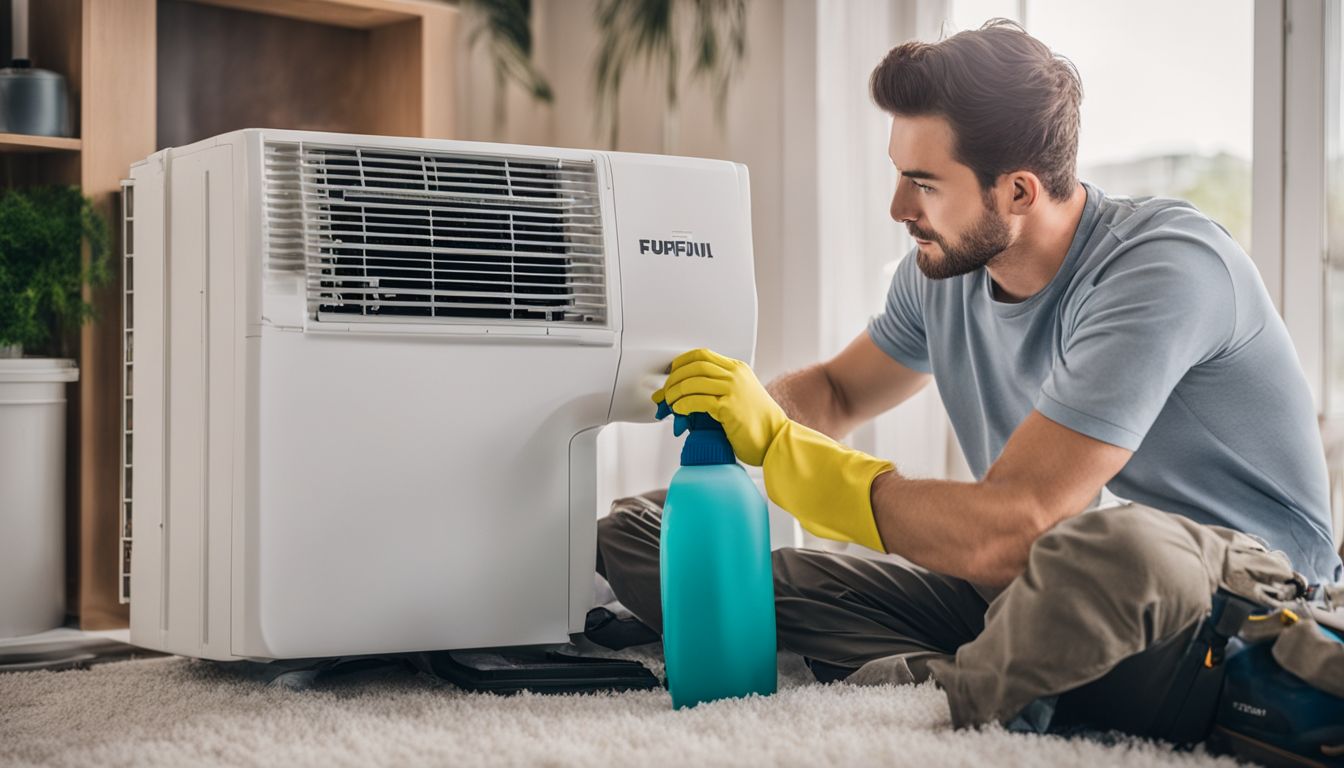As temperatures soar, finding respite from the heat becomes a priority for many. One fact stands out – air conditioning is not just about comfort; it significantly enhances our indoor living environment.
This article will delve into the multiple advantages of air conditioning that go beyond simple cooling, offering solutions to improve your health and home life. Stay cool and keep reading to discover how an air-conditioned space can transform your everyday experience.
Understanding Air Conditioning
Air conditioning systems work tirelessly to keep our indoor environment comfortable. They not only cool the air on sweltering days but also help manage humidity levels, ensuring our homes and workplaces feel fresh and dry.
The core function of an air conditioner revolves around transferring heat from inside a room to the outside, effectively lowering the room’s temperature. This process is facilitated by a refrigerant that changes phase from liquid to gas within the cooling coils.
Modern air conditioners do more than just lower temperatures; they come equipped with filters that capture dust mites, mould spores, and other airborne particulates, thus greatly improving indoor air quality.
Regular maintenance of these units ensures that they operate at peak efficiency and can even lead to energy savings over time due to their energy-efficient design. Users need to understand how their AC operates so they can maximise its benefits while minimising costs associated with improper use or neglect.
The Advantages of Air Conditioning
The benefits of air conditioning extend beyond mere comfort; they encompass a spectrum of advantages that enhance our day-to-day living environment. From safeguarding health to preserving the integrity of household items, the implementation of air conditioning systems has revolutionised the way we experience and interact with our indoor spaces.
Improved Indoor Air Quality
Air conditioners do much more than cool down a room; they also play a key role in purifying the air we breathe. High-quality units come equipped with filters that trap dust, pollen, and smoke, eliminating odours and harmful contaminants from indoor environments.
This process not only cleans the air but also helps prevent asthma attacks and allergic reactions by reducing airborne triggers.
Regular use of an air conditioning system contributes significantly to creating cleaner living and working spaces. Filters found in these systems are essential for capturing particles that can affect our respiratory tract, thus maintaining good ventilation is crucial for health.
Offices with improved air quality see better concentration levels among employees, which can lead to enhanced productivity. In homes, clean air reduces risks of colds and other respiratory problems while keeping pets less prone to parasites like fleas and ticks – a win-win for everyone’s well-being.
Humidity Control
Excess moisture in your home can lead to a host of problems, from mould growth to increased dust mites and allergens. This is where air conditioning units step in with their humidity control capabilities.
Using the ‘Dry Mode’, they can effectively reduce the levels of humidity, creating a more comfortable and healthier living space.
Maintaining an ideal level of indoor humidity isn’t just about comfort; it’s also about cost-effectiveness. A humid environment forces HVAC systems to work harder, which means higher energy consumption and bills.
But thanks to dehumidification functions built into many modern air conditioners, you can enjoy a cool breeze without worrying about dampness creeping into your corners or inflated energy expenses.
Not only do these smart systems prevent overworking by maintaining balance in the air quality, but they also discourage unwanted pests who thrive in moist conditions – ensuring peace of mind on all fronts.
Enhanced Productivity

Keeping cool under pressure isn’t just about staying comfortable; it’s essential for maintaining productivity. Air conditioning plays a significant role in the workplace by creating an environment that helps control body temperatures, which, according to studies, can enhance employee productivity by at least 25 per cent.
This is particularly true during extreme heat when the brain struggles to focus and fatigue sets in quickly due to heat stress.
Offices equipped with air conditions also benefit from improved air quality through modern air filters, boosting workforce efficiency even further. Cooler work environments lead to more focused thinking and help prevent meltdowns caused by overheating equipment such as electrical appliances.
When employees are less distracted by discomfort and office devices operate reliably without overheating, companies reap the benefits of smoother operations and higher output levels.
Reduced Noise and Pests
Air conditioning systems are a game-changer for creating peaceful living and working environments. By allowing homes and offices to keep windows and doors closed, they serve as barriers against the outside world’s racket, such as traffic or construction noise.
This silent sanctuary isn’t just about comfort; it also means you can focus better on tasks at hand without constant interruptions from auditory disturbances.
Moreover, air conditioners help maintain a pest-free zone by sealing off potential entry points that insects use to invade spaces. No more buzzing flies or mosquito bites disrupting your evening relaxation—just cool, clean air circulating you.
These invisible benefits of temperature regulation contribute significantly to making indoor settings not only tolerable but truly enjoyable all year round.
Improved Quality of Sleep
Air conditioning creates a cool haven, perfect for escaping the sweltering heat that often hinders our ability to drift off peacefully. A controlled room temperature is crucial, as it supports deeper and more restorative sleep patterns.
Many people find falling asleep almost effortless when their bedroom is pleasantly chilled by an air conditioner set to a low temperature. This not only enables a quicker transition into sleep but also promotes uninterrupted slumber throughout the night.
Cooler environments tell your body it’s time to wind down and prepare for bed. Air-conditioned spaces reduce high humidity levels as well, which means less tossing, and turning and fewer disruptions from excessive sweating or discomfort during the night.
Sleep experts even suggest that bedrooms should be kept at cooler temperatures for optimal sleep hygiene—air conditioning makes this simple to achieve every season of the year. With better quality of sleep comes numerous benefits: sharper focus, improved mood and increased overall health are just some ways good rest can enhance daily life.
Increased Security
Having air conditioning means you can keep windows and doors shut tight, even on sweltering days. This simple action significantly enhances the security of your home or workplace. Intruders find it far more challenging to gain access when they’re faced with locked entry points.
Thieves often look for easy targets, so a securely closed building is less appealing to them.
A comfortably cool indoor environment, thanks to the A/C system, also decreases the necessity of opening windows that can attract unwanted attention from potential burglars. Knowing your space remains secure while you stay fresh and comfortable provides peace of mind and contributes positively to your overall quality of life.
It’s easier to relax and sleep deeply knowing you are protected from both the heat outside and any security threats due to open windows or doors left ajar in an attempt to cool down.
Protection for Furniture and Electronic Devices
Air conditioners are lifesavers not just for us but also for our household items. They play a crucial role in preventing damage to furniture and electronic devices caused by excessive heat and moisture.
Without proper climate control, wooden tables, chairs, and cabinets can swell or warp as the humidity fluctuates. Electronics too are sensitive; computers, televisions, and gaming consoles need a stable temperature to operate efficiently.
High temperatures can lead to overheating and shorten their lifespan.
Keeping the indoor environment cool with air conditioning creates a haven for your belongings. It maintains optimal humidity levels that help preserve the integrity of wood finishes and protect delicate electronics against data loss or system failures due to heat stress.
This not only extends the life of these items but also saves you from costly repairs or replacements down the line. Regularly using an air conditioner means you’re investing in the longevity of everything that makes your house a home—and keeping those dreaded repair bills at bay.
Understanding Air Conditioner Coils and Their Impact on Cooling Performance
Air conditioner coils play a crucial role in the cooling process. The evaporator coil, located inside the unit, is where the refrigerant absorbs heat from indoor air; this cooled air is then circulated back into the room.
A clean and functioning evaporator coil is essential for absorbing maximum heat, ensuring that your living space remains comfortable even during hot days.
The condenser coil, typically found on the outdoor part of an air conditioning system, expels gathered heat into the outside air. Keeping this coil clean prevents the system from overheating and helps maintain energy efficiency.
Performance drops significantly if these coils become dirty or damaged since they cannot release heat effectively. Regular check-ups and cleaning of both coils are vital to keep your cooling system running smoothly and to prolong its lifespan while keeping energy costs low.
The Role of Air Conditioning in Health and Wellbeing
Air conditioning extends beyond comfort, playing a critical role in promoting health and well-being by creating environments that can alleviate various medical conditions. Its regulated temperatures and air quality contribute to a healthier living space, reducing the prevalence of heat-related illnesses and providing relief for those suffering from respiratory ailments.
Reducing Asthma and Allergies
Air conditioners play a crucial role in creating a haven for those suffering from asthma and allergies. They achieve this by controlling the indoor climate – maintaining cool temperatures while regulating humidity levels.
This minimises the presence of triggers such as pollen, dust, and other airborne irritants that can lead to uncomfortable symptoms or even attacks. With their filters capturing particulates, air conditioning units reduce the amount of allergens circulating through your home.
Regular maintenance ensures these systems continue to filter out harmful elements effectively, helping prevent the growth of mould and mildew which are common allergens. Investing in an efficient air conditioner could be life-changing for people with respiratory sensitivities, offering them relief during seasons when hay fever is at its peak or when pollution levels rise.
The result is not only fresher air but also a significant step towards disease control within one’s living spaces.
Improving Mental Wellbeing
Air conditioning does more than keep rooms cool; it’s a boon for mental clarity and emotional stability. Cool environments can help reduce stress levels, making spaces like homes and offices peaceful havens from the heat outside.
Scientific studies reveal that temperature-controlled spaces aid cognitive functions, including memory retention and decision-making processes. This means tasks at work or study sessions become more productive in air-conditioned surroundings.
Staying comfortable isn’t just about physical relief; it’s crucial for maintaining focus and keeping a clear head. High temperatures are known to cause irritability and fatigue, but with an efficient cooling system, these issues are significantly alleviated.
People find themselves feeling calmer, which is essential for tackling daily challenges with confidence and efficiency. With the brain operating optimally in cooler conditions provided by modern air conditioning systems, achieving improved mental well-being becomes more attainable.
Conclusion
In the quest for comfort and health, air conditioning stands out as a champion. It elevates the quality of our indoor environments by filtering air, controlling moisture levels, and maintaining comfortable temperatures.
Think of those sweltering summer days; with a flip of a switch, interiors transform into refreshing sanctuaries away from debilitating heat. Secure homes and workplaces are achieved since windows remain closed when machines hum quietly in the background.
Consider how calm nights enhance sleep or how cherished personal items stay protected from humidity’s grip. Reflect on the well-being benefits: fewer allergies, sharper focus, and reduced stress levels contribute to overall life quality improvements.
Now is the time to embrace these advances that harmonise daily living with nature’s extremes.
For a deeper insight into how your air conditioning system works, be sure to read our simple guide on understanding air conditioner coils.
FAQs
1. How does air conditioning benefit our health during hot weather?
Air conditioning can protect us from heat-related illnesses like heat stroke and heat exhaustion by keeping our homes cool and comfortable.
2. Can air conditioning improve the quality of indoor air?
Yes, many modern air conditioners come with filters that help reduce indoor air pollution, which can lessen skin irritation and allergies caused by poor-quality air.
3. Is there a way for air conditioning to be energy efficient and environmentally friendly?
Certainly! Using low-carbon options such as energy-efficient models or heat pumps, including air source heat pumps, helps save energy while reducing the impact on the environment.
4. In what ways does having an air conditioner in my home affect furniture and decor?
Surprisingly, consistent use of an air conditioner keeps room temperatures stable, which protects furniture from warping due to high humidity levels and prevents fabric damage.
5. Besides cooling, are there other advantages to using an AC unit at home?
Indeed! An often overlooked benefit is noise reduction since windows remain closed; this creates a quieter atmosphere inside your house so you can focus better on tasks or enjoy undisturbed rest.





